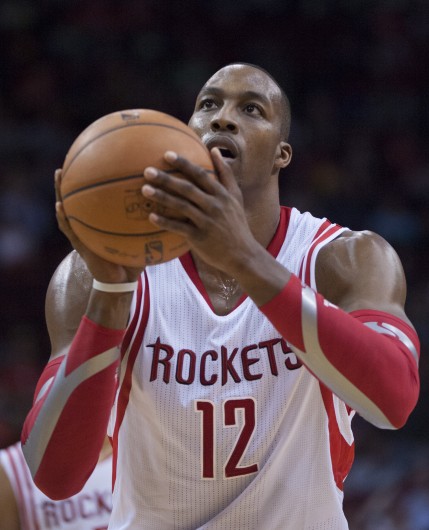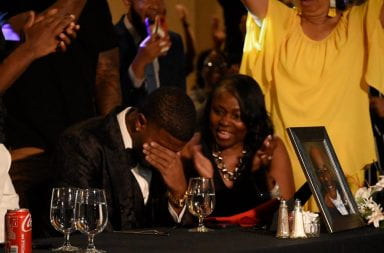
Dwight Howard (12) of the Houston Rockets shoots a free throw against the Sacramento Kings in the second half of the Rocket’s 119-98 victory on Wednesday, Jan. 22, 2014, in Houston.
Credit: Courtesy of TNS
Those of you who have been watching the NBA playoffs — or have been trying to watch it — have seen a free-throw contest as opposed to a basketball game while following the Los Angeles Clippers and Houston Rockets series.
Both teams have been using the heavily debated “Hack-a” strategy against one another. This is when a team intentionally fouls a poor free-throw shooter away from the play in order to put him at the line, in hopes that he misses at least one of his free-throw attempts. That allows the team to avoid playing defense for a possession and having to guard a couple of the most dominant players in the league in Rockets guard James Harden and Clippers forward Blake Griffin.
While this strategy has worked over the course of the season and in the playoffs, it has taken a lot away from the natural flow of the game for the fans. NBA commissioner Adam Silver has said this rule will be looked at in the offseason.
In Game 2 of the Clippers vs. Rockets series, there were 96 free throws attempted, 64 of them by the Rockets. Rockets center Dwight Howard went 8-of-21 at the line and is now shooting 40 percent at the stripe in the series.
The Rockets have not utilized fouling Clippers center DeAndre Jordan as much as the San Antonio Spurs did in their previous series, as Jordan has been shooting surprisingly decent in the first two games at 59 percent.
These fouls not only put a poor free-throw shooter at the line, but they also change the flow of the game and have forced head coaches Doc Rivers and Kevin McHale to remove their big men from the game. Look for the “Hack-a-Jordan” and “Hack-a-Howard” strategies to continue to be used throughout the remainder of the series.
Currently, teams are able to foul away from the play throughout the game except for the final two minutes. I do think it is bad for the game in its entirety, but I do not think it should be adjusted.
Spurs coach Gregg Popovich said it best after he utilized it against Jordan: “If someone can’t shoot free throws, that’s their problem.” The player should be the one working to improve his free-throw percentage to prevent this game plan from being used against him.
One of Popovich’s own players, Tiago Splitter, used to be hacked early in his career. As a rookie, Splitter shot an atrocious 54 percent at the line, but he has improved that percentage to a respectable 75 percent this season.
The most impressive player in the 2015 playoffs so far, Griffin, shot 52 percent from the line early in his career and is now up to 73 percent this season.
Every player in the league has weaknesses that they must improve on. Chauncey Billups used to struggle finishing in traffic, so he learned how to draw fouls. J.J. Redick has learned how to put the ball on the floor and hit a floater or pull-up jumper when defenders close out aggressively on him. The rules were never adjusted for Billups by letting him shoot uncontested layups, and the same for Redick by letting him shoot open three-point attempts.
When Silver and the league look at the rule this offseason, they will have a few options to modify it. First, they could keep it exactly how it is, where a team can intentionally foul except for the final two minutes of the game. I am not sure why something is allowed for the first 46 minutes of the game, but then all of a sudden during the final two minutes it changes. I am not complaining, though, as the last two minutes are the most exciting part of the game.
Another option I have thought of is not allowing a foul away from the ball in the first 16 seconds of the shot clock, and then allowing it the last eight seconds. This gives teams an opportunity to score before a foul is given, while the opposing team must decide to foul or play out the last third of the shot clock.
Finally they may discard the “Hack-a” policy throughout the entire 48 minutes. If this happens, Jordan, Howard, Andre Drummond and other poor free-throw shooters will benefit drastically. These players will earn larger contracts in free agency from teams due to the impact they create on the defensive end and rebounding, while they do not have to worry about them being hacked anymore on the offensive end.
I strongly believe from a basketball standpoint the players must take responsibility to improve on their weaknesses. I expect the rule to be looked at this offseason, and possibly altered to make the games more enjoyable for the fans of the NBA to watch.


